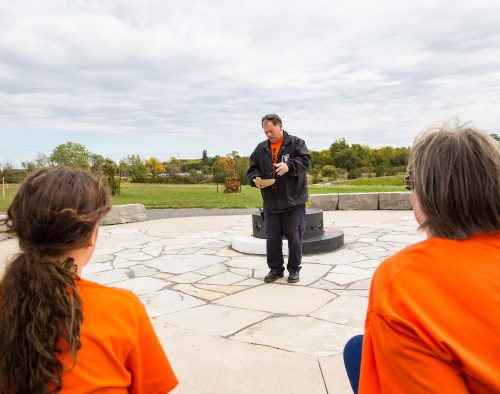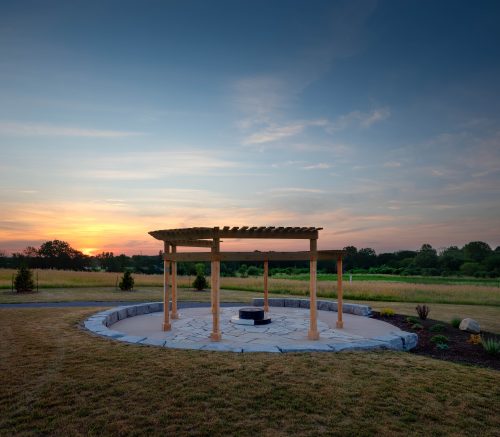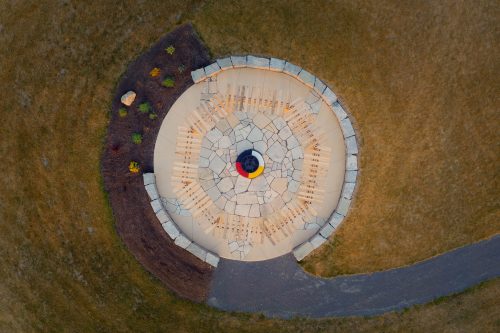The following message is sent on behalf of Dr. Ann Marie Vaughan, President and CEO of Loyalist College
Dear Loyalist College Community,
The first day of June marks the beginning of National Indigenous History Month, a time to celebrate and honour our nation’s heritage and recognize the outstanding contributions of First Nations, Métis and Inuit peoples.
However, celebration and recognition cannot be fully observed without acknowledging the heartbreaking treatment Indigenous peoples have endured as victims of circumstance and survivors of trauma.
Last week’s discovery of a mass grave of 215 Indigenous children on Tk’emlúps te Secwépemc land, at the former site of the Kamloops Indian Residential School, rattled our nation. It is a harsh and sobering reminder of the suffering endured by more than 150,000 Indigenous children who were separated from their families, removed from their communities and forced into residential schools. An event which has had a devasting intergenerational impact. We are saddened by this news, brought to tears by the stories we are hearing, andsend our condolences to the Indigenous community. As a crisis or traumatic event can trigger emotional responses, please know that immediate and confidential services are available. We have included links to resources below.
At Loyalist College, we are committed to the path toward truth and reconciliation. On May 31, we lowered our flags to half-mast and they will remain as such for 215 hours as we collectively remember the 215 children whose lives were taken too soon. I encourage members of our community to reflect on the long-lasting impacts of residential schools and consider the actions we can take toward reconciliation.
Sincerely,
Dr. Ann Marie Vaughan,
President and CEO
Loyalist College
National Indian Residential School Crisis Line
Provides support for former residential school students and those affected. Accessible to all members of the public 24 hours a day, seven days a week by calling 1-866-925-4419.
Crisis Support Line
The Crisis Support Line is staffed by a Traumatic Event Support Team and provides professional emotional support and/or referral to community resources. Accessible to all members of the public 24 hours a day, seven days a week by calling 1-844-751-2133.
Mental Wellness Student Support
My SSP provides mental health support, including access to counsellors by telephone or text, anywhere in the world and in multiple languages. Accessible to all Loyalist College students 24 hours a day, seven days a week by calling 1-844-451-9700 or by downloading the My SSP app through the Google Play or the Apple App Store.
Faculty and Staff Resources
Employee Assistance Program (EAP) services are accessible to all Loyalist College employees and their families to provide support in processing the impact of this unfortunate and traumatic event. Please visit the People and Culture section on the myLoyalist portal.
For more information on self-care following a traumatic event, please reference the guide here, provided by LifeWorks.

National Indigenous History Month (June)
National Indigenous Peoples Day (June 21)
The College’s support of historic events such as National Indigenous Peoples Day is a recognition of our ongoing support of Indigenous culture. On June 21 we celebrate the heritage, diverse cultures, and outstanding achievements of First Nations, Inuit, and Métis peoples. See National Indigenous Peoples Day video featuring footage of Loyalist College’s A’nó:wara Learning Circle and Manager of Indigenous Services Paul Latchford sharing on how home, community, and the natural world contribute to the richness of Indigenous culture.
Thanksgiving Address
The Thanksgiving Address teaches mutual respect, conservation, love, generosity, and the responsibility to understand that what is done to one part of the Web of Life, we do to ourselves.
The Six Nations of the Iroquois Confederacy open and close every meeting with a Thanksgiving Address (Ohen:ton Karihwatehkwen). As we begin our acknowledgment and celebration of the contribution Indigenous culture has had on our heritage as part of #NationalIndigenousHistoryMonth, we do so by giving a prayer of thanks for life and the world around us.
When one recites the Thanksgiving Address, the Natural World is thanked, and in thanking each life-sustaining force, one becomes spiritually tied to each of the forces of the Natural and Spiritual World.

Thanksgiving Adress | Additional Resources:
Skä•noñh – Great Law of Peace Center: Thanksgiving Address
Project 562: A Real Thanksgiving Address
Thirteen Grandmother Moons
Thirteen Grandmother Moons | Additional Resources:
TRACKS Winter Storytelling Series: Thirteen Moons on Turtle’s Back
Open Library Press Books: 13 Grandmother Moons
Kanawayhitowin taking care of each other’s spirit: Moon Teachings
KFL & A Children and Youth Services Planning Committee – Ohenton Karihwateh’kwen – The Words Before All Else
Seven Grandfathers
In the Anishinaabe story of the Seven Grandfathers, a young boy was given the seven sacred teachings by the Seven Grandfathers. The seven gifts: wisdom, love, respect, bravery, honesty, humility, and truth were the guiding principle given to help the people to live a good life, to teach them respect for the Creator, Mother Earth, and each other.
The Seven Grandfathers told the young boy to go out into the world and share the teachings and that “Each of these teachings must be used with the rest; you cannot have wisdom without love, respect, bravery, honesty, humility and truth. To leave one out is to embrace the opposite of what that teaching is.”
In order to achieve balance, one must apply all of the gifts, practice them, and teach them to our children.

Seven Grandfathers | Additional Resources:
Tribal trade Co. – Ojibwe Story of Seven Grandfathers
A reading of “The Story of The Seven Sacred Teaching Animals” by Kirt Bobbie and illustrated by Eric Peters.
Nottawaseppi Huron Band of the Potawatomi – Seven Grandfather Teachings
Open Library Press Books – Seven Grandfather Teachings
Southern First Nations Network of Care – The Seven Teachings
The Medicine Wheel
In Indigenous culture, the circle is timeless, with no beginning and no ending, and is an integral part of their belief system. The Medicine Wheel (sometimes referred to as the Sacred Hoop) represents the process of how life evolves and moves forward. The Medicine Wheel represents the interconnectivity of all aspects of one’s being including their connection with the natural world and is divided into four quadrants: the four stages of life, the four directions, the four elements, the four sacred medicines, the four seasons, the four states of wellbeing, the four colours of mankind, and the four stages of life.
- The four directions: East, south, west, north
- The four elements: Fire, earth, water, air
- The four sacred medicines: Tobacco, sweetgrass, sage, cedar
- The four seasons: Spring, summer, fall, winter
- The four states of wellbeing: Mental, physical, emotional, spiritual
- The four colours of mankind: Yellow, red, black, white
- The four stages of life: childhood, adolescence, adult, elder

The Medicine Wheel | Additional Resources:
A reading of “The Medicine Wheel-Stories of a Hoop Dancer” by Teddy Anderson.
Keewaytinook internet High School – Trout Lake Medicine Wheel Teaching
What is the Medicine Wheel? Teachings by Jeff Ward
Kahwá:tsire Indigenous-Led Child & Family Programs – Medicine Wheel Story
Indigenous Corporate Training Inc. – What is a Medicine Wheel?



